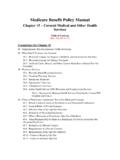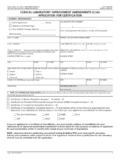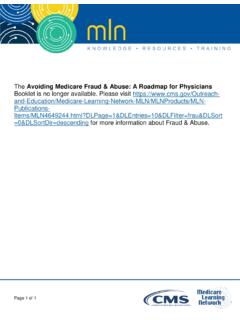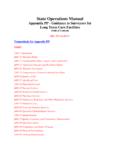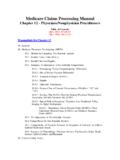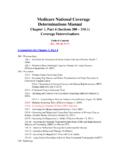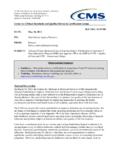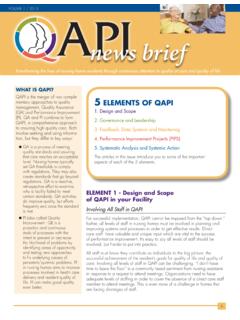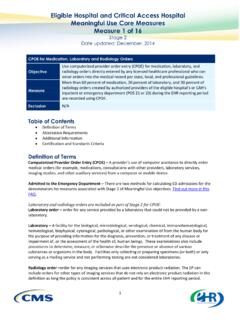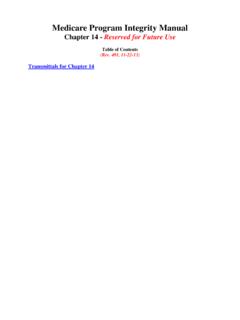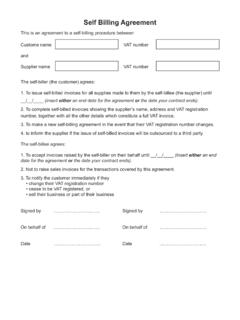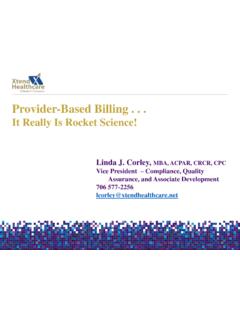Transcription of Billing in Medicare Secondary Payer (MSP) Liability ...
1 MLN Matters SE17018 Related CR N/A Page 1 of 5 Billing in Medicare Secondary Payer (MSP) Liability Insurance Situations MLN Matters Number: SE17018 Article Release Date: September 19, 2017 Related CR Transmittal Number: N/A Related Change Request (CR) Number: N/A Effective Date: N/A Implementation Date: N/A PROVIDER TYPE AFFECTED This MLN Matters Article is intended for all providers, physicians, and other suppliers who bill in a situation where Liability insurance (including self-insurance) is a consideration.
2 The article is of particular importance for those who elect not to file the claim with Medicare , and instead seek payment for their services from a Medicare beneficiary's Liability insurance (including self-insurance) claim. PROVIDER ACTION NEEDED This article is based on information received from Medicare beneficiaries, their legal counsel and other entities that assist these individuals, indicating that providers, physicians, and other suppliers that elect to seek payment from the beneficiary s Liability insurance claim instead of submitting the claim for items or services to Medicare have not generally billed in accordance with the instructions provided or referenced in this article.
3 The FAQs in this article are intended to remind providers, physicians, and other suppliers of the fundamental guidance governing Billing where Liability insurance (including self-insurance) is involved. Please review your Billing practices to be sure they are in line with the information below. BACKGROUND Liability insurance (including self-insurance), no-fault insurance, and workers compensation benefits are primary payers to Medicare . However, CMS regulations and policy for Liability insurance Billing are distinct from those for no-fault insurance and workers compensation benefits.
4 Because the Liability insurance Billing rules are different and place distinct obligations on providers, physicians, and other suppliers (including termination of liens tied to the expiration of Medicare s timely filing requirements), it is important that these rules be reviewed in detail. MLN Matters SE17018 Related CR N/A Page 2 of 5 The options when seeking payment from the Liability insurance, and the obligations and restrictions that accompany them, are discussed with more specificity in the Internet Only Medicare Secondary Payer Manual (Pub 100-05), Chapter 2, Section found at See also, MLN Matters Article MM7355 Clarification of Medicare Conditional Payment Policy and Billing Procedures for Liability , No-Fault, and Workers Compensation (WC)
5 Medicare Secondary Payer (MSP) Claims . This article is available at (Although not the subject of this article, the instructions for situations involving no-fault insurance or workers compensation benefits can be found in Chapter 3 of the MSP Manual.) FAQs for Liability Insurance (Including Self-Insurance) Billing Q1. What are the promptly period rules and do they apply when Billing in situations involving Liability insurance (including self-insurance)? A1. The promptly period is 120 days after the earlier of: 1) the date the claim is filed with an insurer or a lien is filed against a potential Liability settlement; or 2) the date the service was furnished or, in the case of inpatient hospital services, the date of discharge.
6 The promptly period does apply even when a provider, physician, or other supplier is aware that Liability insurance may end up indirectly funding the defendant s settlement. However, following expiration of the 120 days or during that time if it is demonstrated (for example, a bill/claim that had been submitted but not paid) that Liability insurance will not pay during the promptly period, the provider, physician, or other supplier has an option (with certain limitations) to bill Medicare or maintain a claim/lien against the Liability insurance/beneficiary s Liability insurance settlement.
7 Q2. Who do I or the Liability insurance/beneficiary s Liability insurance settlement? (I hear so many different things. My patient was in an accident and I need to know whether to bill Medicare or the patient. My other patient is suing some manufacturer, what do I do about my bill for services to this patient?) A2. Once the promptly period has expired, with the exception of the special rule for Oregon (see below), the provider, physician, or other supplier may bill either Medicare or the Liability insurer/beneficiary s Liability insurance settlement as long as the Medicare timely filing period has not expired.
8 Billing both Medicare and maintaining a claim against the Liability insurance/beneficiary s Liability insurance settlement is not permitted. Once Medicare has been billed, the provider, physician, or other supplier is limited to Medicare s approved amount or the limiting charge if the claim is non-assigned, even if they subsequently return any payment made by Medicare . Claims/liens against the Liability insurance/beneficiary s Liability settlement must be dropped once Medicare s timely filing period has expired.
9 See also the Q s/A s below for more detail. Q3. What is the Oregon rule? MLN Matters SE17018 Related CR N/A Page 3 of 5 A3. By court order, there are very specific alternative Billing rules for Oregon. Generally speaking, the provider, physician, or other supplier may bill either Medicare or the Liability insurance if the Liability insurer pays within 120 days. See the MSP Manual (CMS Pub. 100-05), Chapter 2, Section for specifics on the Oregon rule. Q4. Do Medicare s timely filing rules still apply if the timely filing period expires while the provider, physician, or other supplier is waiting for the Liability insurance payment/beneficiary s Liability insurance settlement?
10 (It s been 3 years and the patient s case still hasn t settled. Can I bill Medicare now?) A4. The existence of a Liability insurance or potential Liability insurance situation does not change or extend Medicare s timely filing requirements. If Medicare is not billed within the applicable timely filing period, the claim will be denied. Additionally, see the information below regarding the requirement that claims/liens against the Liability insurance/beneficiary s Liability insurance settlement (with certain exceptions) be withdrawn once the timely filing period has expired.
